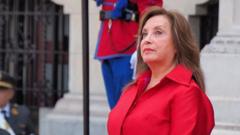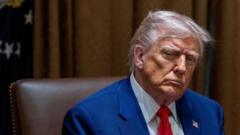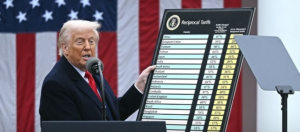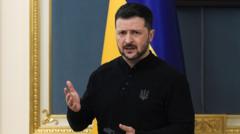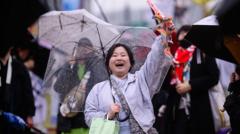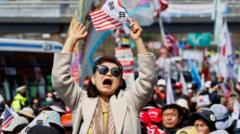As Yoon Suk Yeol faces impeachment, a mix of historical anti-communism and emerging distrust of China fuels political divide within South Korea, transforming public sentiment and shaping national narratives.
**Cultivating Fears: Yoon's Impeachment and Rising Anti-Communist Sentiments in South Korea**
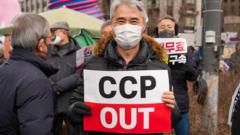
**Cultivating Fears: Yoon's Impeachment and Rising Anti-Communist Sentiments in South Korea**
Exploiting historical anxieties, South Korea's impeached president galvanizes supporters amidst fears of communist takeover.
In the chill of January, outside South Korea's Constitutional Court, a crowd of supporters gathered to rally behind their impeached president, Yoon Suk Yeol. Among them was 22-year-old pharmacy student Shin Jeong-min, whose fears echoed a broader anxiety shared by supporters. Many believe that the opposition party aims to forge a union with North Korea, leading South Korea toward communist rule. "If the president is impeached and a leftist leader takes over, it's the end of our democracy," she exclaimed.
This wave of apprehension is not confined to the younger generation; it reflects sentiments deeply rooted among older Koreans, who lived through the Cold War and the traumatic events of the Korean War in the 1950s. Presently, Yoon is facing serious allegations related to a failed martial law attempt, which he justified by claiming that "communist forces" in the opposition were intent on subverting democracy.
The aftermath of Yoon's declaration of martial law sparked a nationwide discourse on anti-communism. His supporters, ranging from those experienced in Cold War fears to newer generations, view Yoon as the defender against a tidal wave of supposed leftist extremism. "This is a battle for our values," asserted an office worker who joined the protests, reinforcing the narrative that portrays the political landscape as a conflict between democracy and communism.
Historically, the concept of anti-communism has been wielded by South Korean leaders to consolidate power. In the 1960s and 70s, authoritarian governments frequently accused rivals of being 'North Korean sympathizers.' The long-standing practice has instilled a culture of distrust towards political adversaries, and Yoon’s current rhetoric bears a striking resemblance to that of past dictators. Critics argue that this framing serves Yoon's interest in undermining dissent while maintaining control over the narrative.
Though the direct threats from North Korea have diminished over recent decades, the president's warnings resonate within a populace eager for reassurance amidst geopolitical anxieties shaped by North Korea's nuclear advancements and China's rising influence. In recent months, public sentiment has seen a shift, with heightened unease regarding China's potential meddling in South Korea's political matters being voiced prominently at rallies.
Many supporters at recent public events echoed concerns about a global leftist conspiracy, channeling heightened distrust into narratives that pose China as an obscure puppeteer. Statistical analyses suggest a rising perception among younger adults about China's ambitions, diverging from views held by older generations who once saw North Korea as the principal threat. This transition marks a crucial demographic shift in political perception, underlining the malleable nature of fears stemming from historical contexts.
Experts from diverse fields voice that contemporary fears of communism are often artificially amplified. The dialogue originating from Yoon’s administration, though often rooted in historical realities, evolves into a broader anti-communist catchphrase that resonates on social media. "YouTube and other channels are fueling this paranoia," remarked political analyst Cho Jin-man, indicating a crucial need for nuance in the prevailing political discussions about security and identity.
Despite the discontent towards Yoon remaining substantial, there exists a paradox where his ascribing deeply held anti-communist fears to Chinese interference is increasingly accepted among his supporters. "This is becoming a dangerous trend," observed analyst Lee Sang-sin, who likened Yoon's approach to a cult-like ideology that might divide society, raising questions about the future of South Korea’s democratic integrity.
As South Korea grapples with a turbulent political climate, the interpretations surrounding historical fears of communism blend with modern anxieties regarding China, fostering a complex narrative that continues to evolve as the nation thus navigates its identity and democratic ethos amidst internal and external pressures.
This wave of apprehension is not confined to the younger generation; it reflects sentiments deeply rooted among older Koreans, who lived through the Cold War and the traumatic events of the Korean War in the 1950s. Presently, Yoon is facing serious allegations related to a failed martial law attempt, which he justified by claiming that "communist forces" in the opposition were intent on subverting democracy.
The aftermath of Yoon's declaration of martial law sparked a nationwide discourse on anti-communism. His supporters, ranging from those experienced in Cold War fears to newer generations, view Yoon as the defender against a tidal wave of supposed leftist extremism. "This is a battle for our values," asserted an office worker who joined the protests, reinforcing the narrative that portrays the political landscape as a conflict between democracy and communism.
Historically, the concept of anti-communism has been wielded by South Korean leaders to consolidate power. In the 1960s and 70s, authoritarian governments frequently accused rivals of being 'North Korean sympathizers.' The long-standing practice has instilled a culture of distrust towards political adversaries, and Yoon’s current rhetoric bears a striking resemblance to that of past dictators. Critics argue that this framing serves Yoon's interest in undermining dissent while maintaining control over the narrative.
Though the direct threats from North Korea have diminished over recent decades, the president's warnings resonate within a populace eager for reassurance amidst geopolitical anxieties shaped by North Korea's nuclear advancements and China's rising influence. In recent months, public sentiment has seen a shift, with heightened unease regarding China's potential meddling in South Korea's political matters being voiced prominently at rallies.
Many supporters at recent public events echoed concerns about a global leftist conspiracy, channeling heightened distrust into narratives that pose China as an obscure puppeteer. Statistical analyses suggest a rising perception among younger adults about China's ambitions, diverging from views held by older generations who once saw North Korea as the principal threat. This transition marks a crucial demographic shift in political perception, underlining the malleable nature of fears stemming from historical contexts.
Experts from diverse fields voice that contemporary fears of communism are often artificially amplified. The dialogue originating from Yoon’s administration, though often rooted in historical realities, evolves into a broader anti-communist catchphrase that resonates on social media. "YouTube and other channels are fueling this paranoia," remarked political analyst Cho Jin-man, indicating a crucial need for nuance in the prevailing political discussions about security and identity.
Despite the discontent towards Yoon remaining substantial, there exists a paradox where his ascribing deeply held anti-communist fears to Chinese interference is increasingly accepted among his supporters. "This is becoming a dangerous trend," observed analyst Lee Sang-sin, who likened Yoon's approach to a cult-like ideology that might divide society, raising questions about the future of South Korea’s democratic integrity.
As South Korea grapples with a turbulent political climate, the interpretations surrounding historical fears of communism blend with modern anxieties regarding China, fostering a complex narrative that continues to evolve as the nation thus navigates its identity and democratic ethos amidst internal and external pressures.



